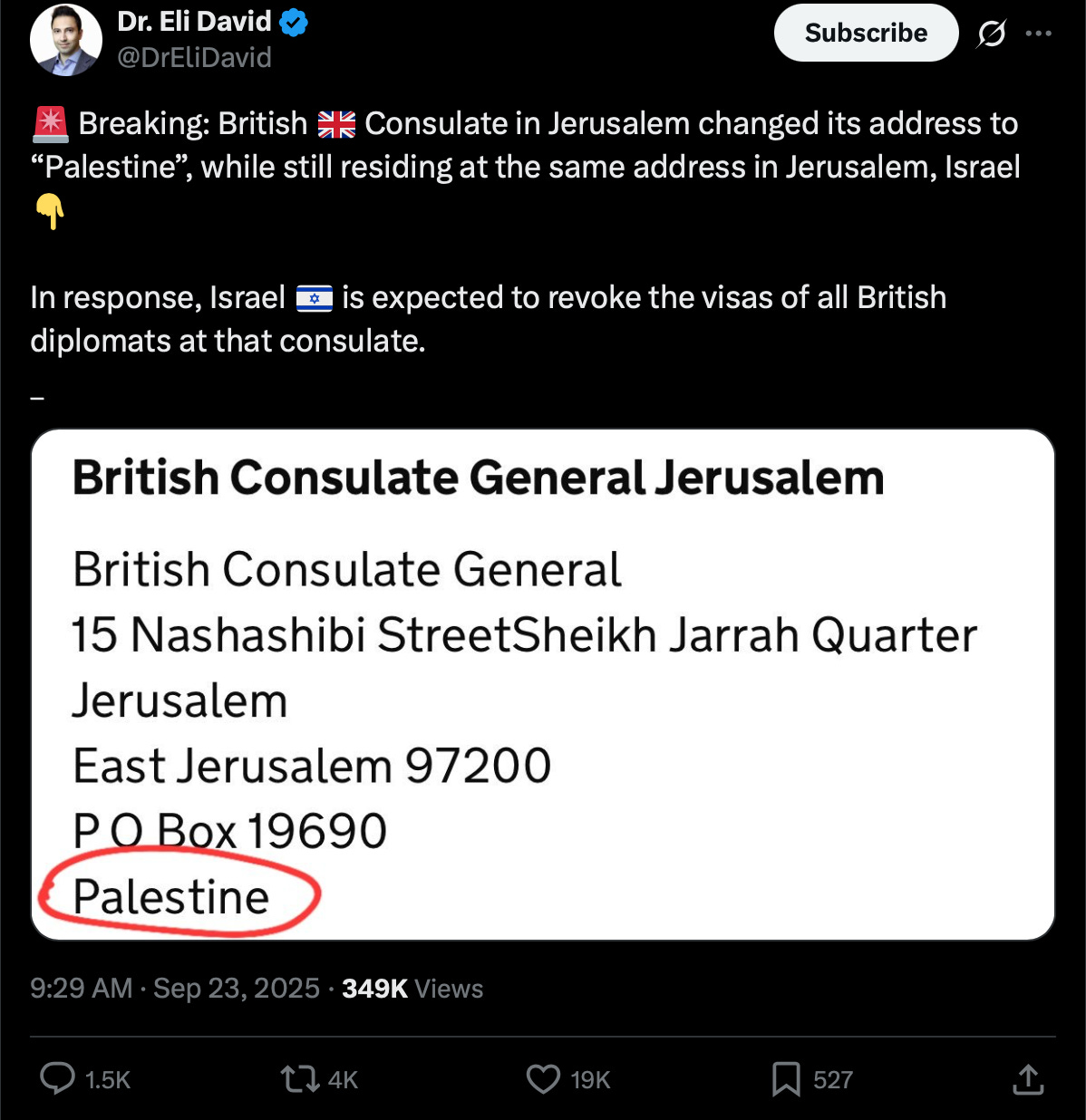Quick Hits on Palestine and Russia
Summary: One is not a state. The other one, unfortunately, is.
Two things are on my mind right now. Okay two million things are, but I’ll share two of them with you.
Let’s start with recognizing Palestine as a state.
That’s basically a summary of recognizing Palestine. There are two imperfect, yet internationally acepted definition of statehood.
In 1919, Max Weber wrote in Politics as a Vocation:
A compulsory political organization with continuous operations will be called a “state” insofar as its administrative staff successfully upholds the claim to the monopoly of the legitimate use of physical force in the enforcement of its order, in a given territory.
This is not my preferred definition, but, in truly tragic news, I don’t run the world. Those who do like it. There is a second definition, which I also don’t like. There are only 17 parties to the Montevideo Convention, but its formulation is de facto accepted as the settled norm for statehood:
(1) a permanent population, (2) a defined territory, (3) a government, and (4) a capacity to enter into relations with other states.
You probably can figure out that the Montevideo Convention is an expansion of Weber’s description.
Palestine can hardly qualify for any of these requirements, let alone all. The closest we come to a full qualification is a permanent population, but that is undermined by the classification of most Gazans as refugees. It does not have a government, either. Hamas was an actual governing organization, but it is a shell, and in any case it is not the recognized governing entity. The Palestinian Authority is recognized. But the Palestinian Authroity doesn’t govern anything. It has a small police force, but it is the Israeli military that provides most of the security in the West Bank: The entity that has a monopoly over violence in the West Bank is Israel. Israel also collects taxes on its behalf—making the Palestinian Authority the first state that cannot even raise revenue on its own. It cannot even establish relations with other states because foreign diplomats need Israeli permission to enter the West Bank—and unconfirmed reporting suggests that British diplomats currently there will have their visas revoked and have to leave.
What really got me going, however, was the second requirement: A defined territory. The much-loved Oslo Accords never fully settled this. Specifically, the status of eastern Jerusalem (mistakenly referred to often as East Jerusalem) was never decided on and was left to future negotiations. The Oslo Accords had been the standard to uphold—until today.
The U.K. Foreign Office has now changed its embassy address:
This is going beyond what the previous agreements have been: allowing Israel and Palestinian representatives to negotiate over the status of Jerusalem.
None of this is to suggest that I am, in principle, opposed to a Palestinian state. I’m just opposed to it in practice because there is not one.
There could have been. In the 2000s, there was a great Palestinian politician, Salam Fayyad, whose primary interest was creating a state. He never succeeded. Eventually, he stepped down from government and left altogether, now residing in the United States. He has grievances against everyone—Israel, the United States, and Palestinians—and he is mostly right. But the biggest problem was the Palestinian national character.
Fayyad was interested in creating a decent state, and Palestinians were invested in destroying the decent state next door: Israel. So you either had to give him the full reins to rule like a supreme dictator and ignore the public will or fall. And falling he did.
Fayyad’s fate was a symptom of the rot: Not only is there no Palestinian state, but there cannot be one either because its democratic mission will be the destruction of Israel.1
Today, the Palestinian Authority is run by an autocrat, Mahmoud Abbas, who is corrupt and uninterested in state-building. Worse, he is 90, and there is no clear indication of who will succeed him. He has pledged to implement meaningful reform, but even if we accept his competence and sincerity—I wouldn’t bet the house on it—he will die soon. Can we trust that his successor will continue the work? My guess is not because there is an ocean separating the acceptable minimum of a good state and the mean of Palestinian politics, a difference so vast and so simple: the difference between construction and destruction, between building and ruin, between civilization and barbarism.
There is no Palestinian patriot like Fayyad. And the liberal democracies so invested in recognizing a Palestinian state are hypocrites because they want the glory without putting in the work. There is nobody like Palestinian Fayyad, but there is the United Kingdom, there is France, there is Canada, and there is Australia. If the creation of Palestine is such an imperative, they can go there and build it. Press releases are easy and cheap; state-building is difficult and expensive. So press release it is. Which is to say, the status quo will persist, and Palestine will not exist.
It pains me greatly that I cannot say the same thing about Russia. Worse than existing, it is also the largest country in the world.
Two weeks ago, Russian drones swarmed Polish territory. The Russian state “clarified” that it was a mistake. You’d think that it would apologize for making mistakes, which Russia did not. Because it was not a mistake. There were approximately 20 drones that penetrated Poland. One or two could be a mistake, not 20. Russian soldiers are stupid, but not this stupid.




